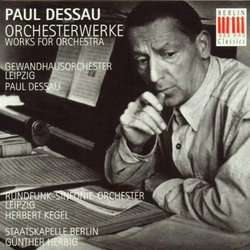| All Artists: Paul Dessau, Herbert Kegel, Gunther Herbig, Leipzig Gewandhaus Orchestra, Leipzig Radio Symphony Orchestra, Staatskapelle Berlin Title: Paul Dessau: Orchesterwerke Members Wishing: 0 Total Copies: 0 Label: Berlin Classics Release Date: 10/1/2005 Album Type: Import Genre: Classical Styles: Historical Periods, Modern, 20th, & 21st Century, Symphonies Number of Discs: 1 SwapaCD Credits: 1 UPC: 782124218225 |
Search - Paul Dessau, Herbert Kegel, Gunther Herbig :: Paul Dessau: Orchesterwerke
 | Paul Dessau, Herbert Kegel, Gunther Herbig Paul Dessau: Orchesterwerke Genre: Classical
|
Larger Image |
CD Details |
CD ReviewsA rather fascinating release G.D. | Norway | 04/28/2009 (4 out of 5 stars) "This disc of orchestral works does in many ways display the more than slight tension between Dessau's commitment to social realism and his avant-garde inclinations - a tension between conformity and defiance to the highly politicized art of Eastern Germany (conformity through the choice of themes, defiance in terms of musical voice); "Meer der Stürme", for instance, strongly suggests that Dessau sought an excuse in purported pictorialism for deploying radical compositional techniques.
Keeping the biographical and political background in mind certainly helps in appreciating the four orchestral works on this disc. Im Memoriam Bertold Brecht was written in 1956-57 and uses themes from their previous collaborations. The outer movements contain grief-laden funeral music based on a minor second played as a descending motif. The middle movement, on the other hand - with the subtitle "War shall be damned" is a cantus firmus stridently asserted by the brass gradually choked by almost scarily calculated contrapuntal patterns. It is overall an interesting and emotionally striking work. The Bach-variations was the most performed orchestral work by the composer in his lifetime, built on a respectful but casual treatment of themes by CPE and JS Bach incorporating the often-used B-A-C-H theme intervowen with the musical letters of Arnold Schönberg's name (A-D-E flat-C-B-B flat-E-G). While immediately appealing on the surface, the work is also contrapuntally ingenious fascinatingly combining and recombining various themes and figures. Two of the variations were also, in fact, not composed by Dessau, but by Goldmann (no. 7) and Wagner-Régeny (no.9). It is probably the most immediately attractive work on the disc, and if not quite a masterpiece at least quite enjoyable and fascinatingly rich. The last two works are in many ways more difficult nuts to crack. The Meer der Stürme is a hugely dramatic work inspired by the landing of the second Russian moon probe and the 50 years anniversary of the revolution; it is a cataclysmic sounding work incorporating and heavily transforming the revolutionary work `Warszawianka', culminating in a high E maintained by 30 violins in an intensive crescendo. The Orchestral Music no. 4 is perhaps a little more traditional, a solemn work based on a Bach theme and, in some sense, seeming to try to underline the importance of Bach to the modern world while at the same time transforming those influences into a thoroughly contemporary statement. The first two works are conducted by the composer himself; the Meer der Stürme by the Leipzig Radio Symphony Orchestra under Herbert Kegel and the Orchestral Music no. 4 by the Berlin Staatskapelle under Günther Herbig. All performances are good, although sometimes a little rough, and the sound quality is decent if not exactly spacious and brilliant (it might be interesting to hear the Meer der Stürme in a modern, more dynamic recording). All in all, this is a rewarding and rather fascinating disc, well worth your acquaintance." |

 Track Listings (18) - Disc #1
Track Listings (18) - Disc #1